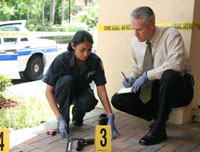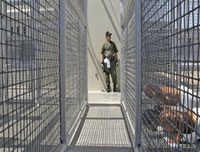Criminal Justice
Is Criminal Justice for me?
A degree in criminal justice could lead to a career in…

...law enforcement. Police officers are responsible for ensuring the public stays safe, which may mean patrolling a neighborhood or responding to complaints and emergency calls. Rather than patrol, detectives spend their time investigating crimes that have already taken place.

...social work. The role of a social worker is to help individuals and families get their life back on track. This often includes working with juvenile offenders or people with substance abuse problems who have had encounters with the law.

...legal affairs. Many paralegals and court reporters have a degree in Criminal Justice that has been supplemented by other studies. These individuals are responsible for assisting lawyers and judges in administering the law.

...private investigation. Private Investigators are usually hired to investigate a person’s background, trace missing persons, and discover financial fraud. Some even work as body guards for high-profile celebrities or bounty hunters.

...corrections. Enforcing security in a court room or prison are the jobs of bailiffs and prison guards, just two career options in corrections. Both of these roles are to make sure that people do as they are instructed, whether they are testifying or incarcerated

...homeland security. From becoming a customs agent to working for the Federal Bureau of Investigation, almost all federal agencies have roles that are appropriate for someone with a degree in criminal justice.
What do all these careers have in common?
A strong foundation in the law and its enforcement.
Whether you are interested in protecting a city or nation, helping individuals get their life back on track or aiding them in a legal defense, you need to have a firm understanding of the legal system and the way it operates.
